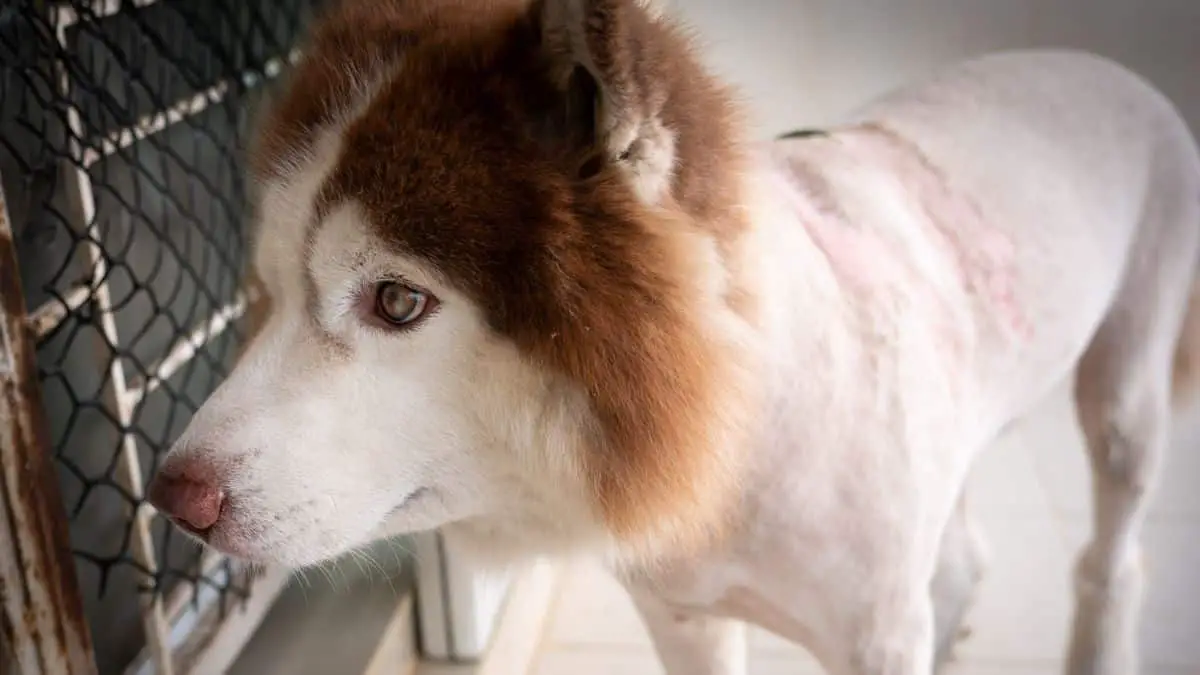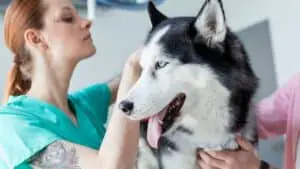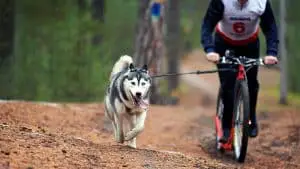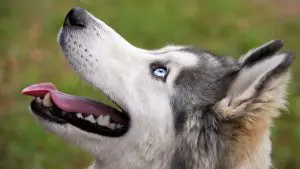Siberian Husky Skin Problems (Full Explanation)
One of the most striking and remarkable aspects of your Siberian Husky is his gorgeous double coat. As well as helping to keep him warm in winter and cool in summer, your Husky’s coat also helps protect his delicate skin from sunburn and harmful skin infections.
Although they are generally considered a healthy, robust breed of dog, Siberian Huskies do tend to suffer from a variety of skin problems. While some of these – including fleas and other parasites – are not particularly unique to Huskies, there are a couple of skin diseases that Huskies are genetically prone to. Many of these are treatable and can be easily remedied in consultation with your vet.
Many of the common skin problems suffered by Siberian Huskies do not present any cause for alarm. If they are addressed quickly and efficiently, the worst your Husky will suffer is some minor discomfort while he is being treated. If left untreated, however, even a common condition can become much more serious to the health of your Husky.
Table of Contents
Husky skin problems and their causes
While Huskies are prone to many of the same skin disorders as any other breed of dog, they do have one particular genetic predisposition that makes them much more likely to suffer a particular type of skin problem.
Huskies have a genetic trait that causes them to absorb zinc poorly. This is known as zinc-responsive dermatosis. In very basic terms, this means that no matter how much zinc your dog consumes, he is unable to absorb it properly as he lacks the proper enzyme that allows for the zinc absorption process to occur.
This zinc deficiency can also make itself known in a condition known as nasal solar dermatitis, or Collie Nose. This is when a zinc deficiency collides with excessive sun exposure and will cause your Husky’s nose to flare up with a variety of signs and symptoms.
Of course, Huskies may also develop skin problems if they are not well taken care of. This category of problems has nothing to do with the genes and occurs as a direct result of poor diets and hygiene. In such cases, you may notice that your Husky has dry skin, lethargy, and a dull coat. In this case, a quality diet will solve many of the issues.
Allergies in Siberian Huskies can also cause skin problems. In fact, most Siberian husky skin problems are caused by allergies. These allergies could be caused by food or environmental factors such as dust, mold, grass, or pollen.
Symptoms of common Husky skin problems
Many of the symptoms that arise from Husky skin conditions are the same and can be difficult to tell apart. This is why it is important to consult your vet as soon as you notice any of the symptoms listed below. Often, your vet will take a skin biopsy to diagnose the exact cause of your Husky’s skin issues, and determine a proper cause of action.
Itchy, flaky skin
As to be expected, one of the primary indications that your Husky might be suffering from a skin condition is itchy, flaky skin. While it can be difficult to see some of the more obvious signs that your Husky pup is suffering from a case of the itches because his thick double coat is hiding most of the evidence, there are a few other types of signs you can look out for.
If he is itchy, your Husky may chew or bite his legs and back in an attempt to relieve his discomfort. As other common issues impacting canines such as fungal infections, mite irritation, fleas, and scabies can also result in itchy skin, it is important you as the owner are monitoring these itch-scratching tendencies carefully!
While most other health conditions that cause itchy skin will typically cause raised bumps and lumps on the skin, a more insidious skin condition such as an allergic reaction or zinc deficiency will also cause skin crusts to form.
Hair loss
This is one of the most common symptoms of a skin condition. Whether your Husky has hair loss through insufficient nutrients or because they have been rubbing and scratching themselves, large bald patches should be a sign that you may need to take your Husky for further investigation.
Lethargy and listlessness
If your Husky is suffering from a zinc deficiency, it is likely that he will feel run down and tired. You may notice that he exhibits less interest in his usual activities, and may even exhibit less interest in his food. If either of these symptoms continues for an extended period of time, take your Husky to the vet for a professional opinion.
Redness and lesions
Zinc deficiency, that nasty genetic condition that affects some Huskies, can cause skin lesions to emerge. In most cases, these tend to form on the footpads, genitalia, and face.
These symptoms are particularly noticeable if your Husky has developed nasal dermatitis. If redness and lesions begin to form on the nose of your Husky, it could be a sign of zinc deficiency and malabsorption.
Treating skin problems in Huskies
Most Siberian Husky skin problems are preventable and treatable.
If the skin problem is caused by zinc deficiency, ensure your Husky is receiving high zinc meals. Bones and meat are great sources of zinc. If you don’t notice an improvement, your vet may prescribe some form of zinc supplementation.
Where your Husky has skin problems caused by allergies, it is best to watch him closely and try to identify whatever is causing skin allergies. Skin problems caused by allergies are best treated by avoiding whatever factor or allergen that is causing the reaction. It could be as simple as changing your dog’s diet or even ensuring that his environment is free from all allergens.
Frequently Asked Questions
Are Siberian Huskies prone to skin problems?
While Siberian Huskies are no more prone to some of the more common skin conditions than other breeds of dog, they are susceptible to skin problems that result from an inadequate supply of zinc.
This is a genetic peculiarity unique to Huskies and is not something you necessarily have control over.
If you notice some of the more common symptoms of a zinc disorder, such as redness, lesions, or flaky skin, consult your vet. If your Husky is consuming a high quality diet but is unable to absorb the benefits of that diet, then you may need to consider a vet-prescribed supplement.
Why is my Husky itching so much?
Is you Husky rubbing himself against every piece of furniture in the house? Can’t seem to stop biting his legs and back? While the most common conclusion might be an infestation of fleas or other parasites, it could be that your Husky is suffering from a more serious, underlying skin condition.
While a variety of things can give rise to itchy skin in a Husky, some of the most common are an allergy or zinc deficiency. Allergies can come about from a variety of sources – certain foods or environmental factors might set your dog off – but a zinc deficiency is a genetic condition that can be hard to control.
Whatever the cause, prolonged itching should be investigated and addressed by your vet.
Do Siberian Huskies have health problems?
Generally speaking, Siberian Huskies are relatively healthy animals. There are, however, a few health conditions that they suffer from as a result of genetics (and bad luck!).
Some of these health conditions include skin problems as a result of zinc malabsorption, eye issues, and hip dysplasia.
All of these conditions can be readily addressed by your vet with regular check-ups or simple, painless tests.
Can my Siberian Husky get sunburn?
Your Siberian Husky’s coat is a marvel – not only does it help keep them cool in summer and cold in winter, but it also helps protect them against sunburn.
Given that your Husky originated from a very northern climate where the sun shone for 24 hours during summer, this trait is perhaps not surprising. In fact, one of the only areas on your Husky’s body that is not covered with fur – his nose – is the area that is most likely to be adversely affected by the sun.
If your Husky suffers from zinc deficiency, then UV exposure to any unprotected areas of skin can cause redness, lesions, and – of course – sunburn.
Should I shave my Siberian Husky’s fur if he has skin problems?
Unless it has been specifically directed by your vet or needs to be done as a result of a surgery, it is never advisable to shave your Husky’s fur.
While some owners might think they are doing their Husky a favor by shaving his fur in the summer, the very opposite is true. Your Husky’s unique undercoat is specially designed to keep him cool during the hotter months, and shaving his fur can lead to sunburn and harmful UV exposure.
There is no skin disease that your Husky can suffer from that would require you to shave his fur.







